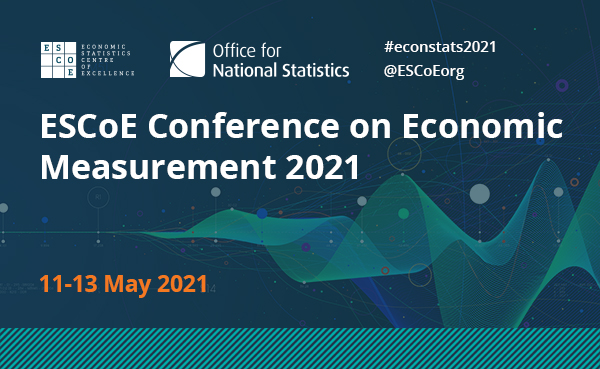By Josh Martin
The 2022 annual ESCoE conference on economic measurement marked an ending and a beginning in many ways. It was the first physical conference for many since before the pandemic, the first time many attendees had visited Scotland, and of course the first outing for much of the new and cutting-edge work on display. It was also the last annual conference to be held under the current version of ESCoE, with ONS currently re-tendering for the next five years of the ESCoE.

It was quite appropriate, therefore, that Sir Charlie Bean should open the conference, as arguably the founding father of the ESCoE, created in the seeds of his eponymous ‘Bean Review’ in 2016. Charlie reflected on the five (well, six) years since then, and gazed into his crystal ball to explore what might lie in the next five. There were plaudits for the achievements and developments at the ONS over the period (many facilitated by ESCoE research), but matched by the challenges Charlie saw ahead – from digitalisation, AI, the environment, a post-covid society, and ever-increasing demand for statistics.
Productivity has always been central to the ESCoE agenda, reflecting the importance of the “productivity puzzle” in the UK economy’s recent history. This year’s conference was no different, with many of the papers, posters and sessions dedicated to productivity measurement and analysis. Chiara Criscuolo, a powerhouse of productivity research, gave the second keynote of the conference, exploring the relationships between productivity and teleworking during the pandemic. As Chiara demonstrated this marks another end and beginning, with attitudes, preferences and experiences of homeworking having changed so dramatically over the past two years. While the net result on productivity remains uncertain (and few were willing to make a bold prediction!), the measurement community will be key to finding the answer.

One thing not changing at this conference was the quality of papers, which was once again high. I asked several fellow attendees to name their favourite paper of the conference, and few could keep their answer to just one. As one put it to me, the atmosphere is supportive, and the research is presented free of agenda – qualities that are increasingly scarce in the world around us. My personal favourite session was on capital and growth accounting, featuring four excellent papers – both on the empirics and the implications. But of course, you can’t be in all the sessions!

There is also no end in sight of the demand for new and better statistics from the ONS and the measurement community at large. A panel session on subnational data revealed many challenges, but plenty of resolve to continue to progress this important work. More granular data may also help with the communication of statistics, which another panel session explored. This made clear the benefits of communicating better – both for us as researchers, and for the audience.
Renewed interest in price and inflation statistics may feel like ‘back to the future’ for some, although for myself and many of the other young attendees, the current inflation rates are the highest we’ve ever experienced. Papers and sessions on advances in the measurement of inflation, presumably submitted and accepted some months ago, felt prescient in the current climate. It’s a reminder that topics are rarely popular for ever, nor out of fashion for long – revisiting past research in today’s context continues to offer fruitful opportunities.

In the third keynote, and closing the conference, Professor Michael Pollitt explored yet another crucial topic for economic research: the environment. Not long since Glasgow hosted the international climate conference COP 26, Michael argued for more nuanced productivity measures of the electricity and gas industries to better reflect their interaction with environmental factors. He painted a rather bleak picture of the future economy in a Net Zero world, albeit demonstrating that low productivity does not mean low value.

The city of Glasgow made a perfect setting for a conference full of endings and beginnings. For those lucky enough to have time to explore it, we found a modern and vibrant city co-existing with a beautiful historical setting. The famous necropolis near the Glasgow cathedral gives excellent views over the lively city landscape – a juxtaposition of perspectives. As the Depute Lord Provost told us, Glasgow is a recognised city of culture, heritage and creativity, and for a few days, of economic measurement as well.
This is also a time of endings and new beginnings for me personally. I started at ONS in September 2016, just months after the publication of the Bean Review. I’ve grown my career alongside the ESCoE, and have the happy record of having attended (virtually at times) each of the five annual conferences it has held. After 5 happy years at ONS, I moved to the Bank of England on secondment earlier this year. But I retain a pride and passion for ONS and ESCoE – a sentiment shared by many I spoke with in Glasgow. ESCoE seems to inspire and bring together such creativity and genuine care for economic measurement, that I suspect few outside the community would imagine is possible for a field like ours. Long may it continue.
–
As part of the ESCoE Conference on Economic Measurement 2022, all three Plenary Sessions, interviews with the three keynote speakers, and some additional sessions were all recorded. These recordings, as well as presentation slides where available, can be accessed via links from the event page here.

Josh Martin is an Economic Advisor at the Bank of England, and an ESCoE Topic Lead.
ESCoE blogs are published to further debate. Any views expressed are solely those of the author(s) and so cannot be taken to represent those of the ESCoE, its partner institutions or the Office for National Statistics.











